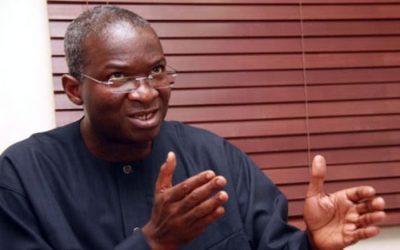Why Julius berger is ‘preferred’ contractor for Nigerian projects — Fashola
Babatunde Fashola, minister of works and housing, has explained why Julius Berger is preferred above “indigenous companies” when entrusting infrastructural projects to companies in the country.
He said the firm is a ‘Nigerian company’ and should not be seen as a foreign firm.
Mr Fashola said this before a joint session of the committees on housing of both houses of the National Assembly Thursday.
He said the company is registered in the country and trades on the Nigerian Stock Exchange hence, it has equal chances of bidding for contracts like every other companies registered in the country.
“By Nigerian law, Julius Berger is a Nigerian company. That’s the law of this country. You cannot do a contract in Nigeria if you’re not registered as a Nigerian company. That’s an act of parliament. We don’t set those (inaudible), once you comply with Nigerian law as a Nigerian company with a certificate of occupancy
“The shares of Julius Berger are traded on the Stock Exchange of Nigeria, not on the stock exchange of London. The shareholders and owners are mixture of Nigerians, Germans and also Lagos state government and whether it is Akwa Ibom or Cross River is also a shareholder. The chairman is a Nigerian.
“So let’s be clear (on) what the definitions are. We don’t set the definitions. So if a Nigerian company bids, we can’t exclude it because apart from the main works there are a lot of subcontracted works that we also must pay attention to.”
He added: “On the second Niger bridge when I went there, the marine works and all the boat works there (are) by indigenes who are paid. They hire their boats to do all the underground, geological water works.”
He, nonetheless, said the country has to come to terms with the limitation it has in technology. For this reason, seeking expertise abroad won’t be an unpatriotic move, he said.
The minister also called for improved funding to existing road construction in the country.
He said as a cushion to the existing limited budgetary provision for the constructions of roads, the government has subscribed 28 roads to the non-interest sukuk bond.
“What the budget provided for was not going to take us anywhere. So when we looked at those roads that will go into the sukuk it was a creative way of getting private capital to come to fund those assets.
“So we took 28 roads and made sure that the volume of traffic, the access to port, access to depot, connectivity to agro areas, which are the top economic focal areas of government, remain in our considerations as we chose the 28 roads that will benefit,” he explained. (Premium Times)


